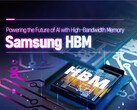It is not a secret that Samsung Foundry isn’t doing to well. The company is reportedly grappling with low yields of its most advanced process nodes, which have also impacted the production of its next-gen 1.4 nm node. There is also the issue of High-Bandwidth Memory (HBM) production.
While Samsung has finally been approved to supply Nvidia with HBM3E memory for AI chips after failing to receive the latter’s approval last year, the company is still far behind SK Hynix, the main supplier of HBM to Nvidia. However, things could’ve turned out differently had Samsung not rejected Nvidia’s proposals in 2018.
A new report claims that Nvidia CEO Jensen Huang proposed widening the HBM partnership between the two companies back in 2018. Jensen Huang allegedly visited Samsung in 2018 to propose cooperation in three key areas between the two companies. The three areas, which include HBM production, development of new process nodes, and cooperating on CUDA, could’ve seen Samsung become one of Nvidia’s key partners.
However, Samsung reportedly rejected Nvidia’s partnership proposals. Jensen Huang seemingly expressed frustration at the Korean giant’s answer, stating that “there was no one at Samsung to discuss long-term strategy with me”.
The inability of Samsung to discuss long-term strategy with Nvidia could be attributed to a criminal investigation against Samsung Electronics Chairman Lee Jae-Yong on multiple charges, which was ongoing at the time.
As we all know, Nvidia has been the key benefactor of the AI gold rush, courtesy of its AI chips, which have seen unprecedented demand. HBM is one of the most crucial components of these AI superchips, as accelerators like the H200 need ample amounts of high-throughput memory for AI inference.
Nvidia gets most of its HBM chips from SK Hynix. This transaction has been hugely beneficial for SK Hynix, as the company’s stock price, at the time of writing, has grown more than 220% in the last five years.
Samsung’s decision not to work with Nvidia could also have affected Samsung Foundry. TSMC currently produces all of Nvidia’s AI chips, including the latest B200 GPU. There have been reports that Nvidia might employ Samsung to produce its future gaming chips on the 2 nm process node. But, there is no information regarding Samsung producing Nvidia’s AI accelerators.
So, in the wake of Intel’s troubles and Samsung’s inability to keep up with TSMC, TSMC has enjoyed a monopoly on Nvidia’s AI GPUs.
While it might be too late for Samsung to completely mitigate the effects of its proposed shortsightedness of the past, the company is trying to win some HBM business from Nvidia and AMD. It is reported that the company is looking to supply HBM4 to both companies in early 2026.
Source(s)
MK (Korean) via Jukan on X, Teaser image: Igor Shalyminov on Unsplash, edited











